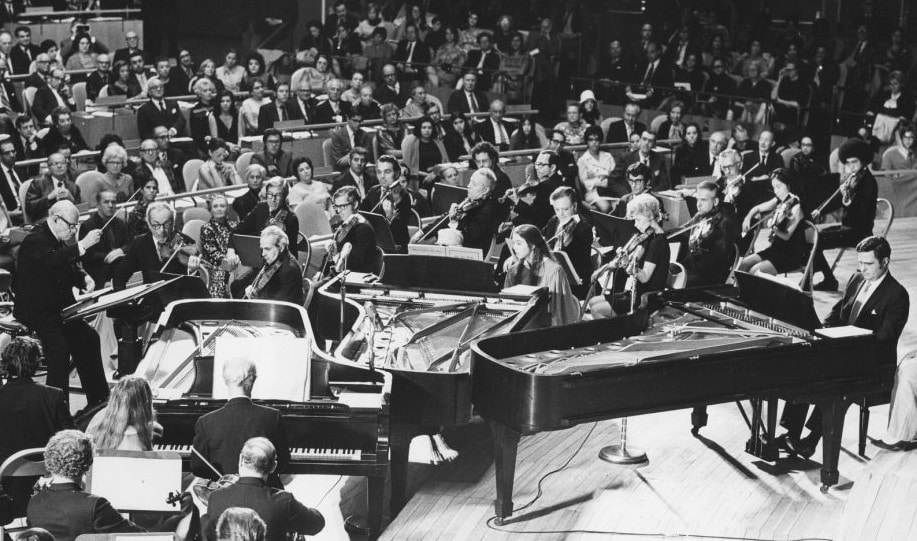Lang and Beiser win $50k grants
mainThe composer David Lang and the cellist Maya Beiser are among 37 United States Artists announced today.
Details here.


The composer David Lang and the cellist Maya Beiser are among 37 United States Artists announced today.
Details here.

We’ve been given to understand that tonight’s Lebrecht…

Pablo Casals conducts a gloriously old-fashioned 1971 performance…

From the last Lebrecht Album of the Week…

Jiří Pánek, who died on December 19 aged…

Session expired
Please log in again. The login page will open in a new tab. After logging in you can close it and return to this page.
Is she going to use her grant to pay for lessons in using the bow in her right hand?
(Apologies for snark if she is actually left-handed – I once shared a desk with a guy who played left-handed!)
You may forward your complaint to the photographer and his SLR Camera. She plays holding the bow in her right hand.
It could be that the image was reversed for artistic reasons. Very view cellists or violinists choose to bow with the left hand, even if they are left-handed. It requires that the instrument be somewhat reconstructed. Not only does it need to be strung backward, but the fingerboard, bridge and nut need to be altered and inside is a piece of wood called a “bass bar” which needs to be placed on the side with the lower strings. It’s a lot of trouble, especially when one considers that both hands are always quite busy anyway.
Mostly there are no artistic reasons but merely unedited pictures or oversights by the editors. Certain professional cameras will take a picture that will “come out” upside down and mirror-inverted. It happens that editors will print the picture right-side up but will forget about the inversion. The final product:
media.npr.org/assets/img/2014/09/11/mayabeiser4_byioulex_wide-8b30c1ca97427f0f8e1f7f2cb03fd9edd85f63a3-s900-c85.jpg
The awards illustrate how strongly the musical establishment in the USA rewards classical musicians who embrace the postmodern/neoliberal concept of merging classical music with commercialized, market-oriented work. The already hegemonic, American pop-music-industrial complex could not have wished for more — which of course is no coincidence. According to this philosophy, the market is to be the sole arbiter of all human endeavor. It is little wonder that the European new music establishment (which suffers from its own biases) views these developments in the US with almost pure contempt. Here are a couple examples of the winners working in a classical vein:
Maya Beiser:
https://www.youtube.com/watch?v=pUit3XPKx9Q
Sarah Worden:
https://www.youtube.com/watch?v=d7GtnNfqJK4
The only way for the industry to survive is to standardize, so that consumption of music is homogeneous.
A quick perusal of the relationship that millennials have with music explains perfectly why the main distribution channels (iTunes, Spotify, Pandora, etc) are now focusing on curating music playlists as a commodity to accompany an activity (E.G. Music for running, music for studying, music for Friday afternoon with friends, music for driving the road, etc) .
Under that scenario, genres and artists become obsolete: what is important is the EFFECT, not X artist or Y genre.
Although dystopian, it would not be too crazy to imagine a future in which music at large has become 100% utilitarian: artists at any genre are niche players and the majority of the music produced by “the industry” is created by algorithms that create sounds specially dedicated to ACTIVITIES, not taste.
Under that scenario, the whole profession of music is obsolete, becoming a little bit more than a trade – like being a carpenter, or a glass blower.
Look around you, even badly, and you’ll see that the pieces are already in place for this to happen: autotune, growth of EDM, standardization of all musical genres, industry consolidation, etc.
What is the role of classical music in all of this? A place in a museum.
I watched the Beiser clip, or at any rate some of it. Pass the hemlock latte, please.
The “American neoliberal establishment” could care less whether a composer works in the idiom of post-Webernian serialism, minimalism, or the more or less tonal but somehow very abrasive idiom of the “Bang on a Can” school, sometimes dubbed “totalism.” The “American neoliberal establishment,” even if it really exists, generally is completely indifferent if not hostile to any sort of cultural expression that is not dumbed down for maximum enjoyment by the passive masses (the American equivalent of “panem et cirences”).
I didn’t use the term “American neoliberal establishment,” but as a group of influential economists it does exist. It originated at the University of Chicago in the 40s and was comprised of the followers of Friedrich Hayek, the most notable being Milton Friedman who philosophies became a central part of the Reagan administration and have continued unabated since. They are fundamentally opposed to public arts funding, and openly assert that the market should formulate artistic endeavor. Their view also strongly influence the corporate oriented Ford and Rockefeller Foundations who are principal funders of the US Artists program.
For a concrete example, an important member of this establishment is the Ludwig von Mises Institue. See their article “Government Grants Make Arts Worse” here:
https://www.mises.ca/government-grants-make-art-worse
The Hoover Institute at Stanford is another such organization and makes similar attacks on arts funding — though it attempts to appear more balanced. See a transcription of a debate they hosted entitled “Terms of Endowment” here:
http://www.hoover.org/research/terms-endowment-government-funding-and-arts
Or you can just pretend these influential people and organizations don’t exist and that our lack of a public funding system for the arts is just some sort of coincidence…
And just in case I need to connect the dots for anyone, market-oriented classical music, often of a cross-over nature, is neoliberalism’s riposte to public arts funding. Bang On A Can is obviously one of their darlings.